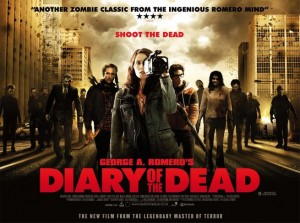 George A. Romero’s latest film, “Diary of the Dead†is the fifth in a series of gory thrillers that started with “Night of the Living Dead,†an incredible movie that paved the way for “Dawn of the Dead,†“Day of the Dead†and “Land of the Dead.†Now we get “Diary of the Dead,†a film that really says something about Romero: After being a filmmaker for 40 years, he still likes to make films that are as bloody as they are brilliant. The old man’s still got it.
George A. Romero’s latest film, “Diary of the Dead†is the fifth in a series of gory thrillers that started with “Night of the Living Dead,†an incredible movie that paved the way for “Dawn of the Dead,†“Day of the Dead†and “Land of the Dead.†Now we get “Diary of the Dead,†a film that really says something about Romero: After being a filmmaker for 40 years, he still likes to make films that are as bloody as they are brilliant. The old man’s still got it.
It’s entertaining, yes, but it’s also challenging – it makes you think. There’s a documentary called “Midnight Movies: From the Margin to the Mainstream,†where Romero speaks about his inspiration and style: “Horror movies should have a little moral,†he says. “You can use it as a platform to maybe express some anger or something.â€
The characters in “Diary of the Dead†certainly are angry…and why wouldn’t they be? They live in a world that’s become an ugly parody of itself, where reality unravels with startling ease. Worst of all, there’s nothing anyone can do except watch as their world disintegrates.
The story is about dead people who murder the living. Anyone they kill becomes one of them. There’s millions of them all around the world – and they just keep on coming.
Meanwhile, there’s a group of film students making a horror movie in Pittsburgh. When the plague hits, their film becomes a documentary. (What else is there to do?) They’re more than a little ashamed of themselves for exploiting the situation – “This is a diary of cruelty,†one character observes – but as they say, you’ve got to be cruel to be kind: They want to expose a real and awful truth about the world they live in.
Almost every review of “Diary of the Dead†mentions movies like “The Blair Witch Project,†“Cloverfield†and “Redacted.†That’s because it’s one of those shaky-camera films that has the same authentic feeling all of those did. We’re in the digital generation now – Romero should be credited for approaching it so gracefully at his age. (He’s 68, by the way.) But when you think about it, a lot of his movies are like that. Each of his films works as social commentary for one particular time and place, which might explain the chilling urgency beneath each shot. (You won’t find it in the remakes of “Night of the Living Dead†and “Dawn of the Dead.†The anger isn’t there.)
His films are even kind of funny, at least in a madhouse sort of way. As serious as “Diary of the Dead†is, there’s something funny about watching a bunch of kids running around with cameras, shooting dead people. It was George Carlin who once asked: “You know where you never see a camcorder? At a funeral. Wouldn’t that be fun?â€

Leave a Reply